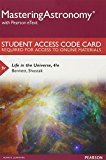
Limited Thinking. Throughout this book, we have generally assumed that any life found elsewhere would be at least somewhat similar to Earth life; for example, we assume it would be carbon-based, most likely use liquid water, and gain energy from sunlight or chemistry. Are these assumptions still valid in light of what we’ve learned about jovian moons? Under what circumstances might we need to broaden our assumptions? Explain.
Want to see the full answer?
Check out a sample textbook solution
Chapter 9 Solutions
Mastering Astronomy with Pearson eText -- Standalone Access Card -- for Life in the Universe (4th Edition)
Additional Science Textbook Solutions
Physics for Scientists and Engineers with Modern Physics
Physics for Scientists and Engineers: A Strategic Approach with Modern Physics (4th Edition)
Physics for Scientists and Engineers: A Strategic Approach, Vol. 1 (Chs 1-21) (4th Edition)
Conceptual Integrated Science
College Physics
An Introduction to Thermal Physics
- If you represent Earth’s history by a line 1 m long, how long a segment would represent the 400 million years since life moved onto the land? How long a segment would represent the 4-million-year history of human life?arrow_forwardWhat do we mean by primitive material? How can we tell if a meteorite is primitive?arrow_forwardDescribe the current atmosphere on Mars. What evidence suggests that it must have been different in the past?arrow_forward
- If, in the remote future, we establish a base on Mercury, keeping track of time will be a challenge. Discuss how to define a year on Mercury, and the two ways to define a day. Can you come up with ways that humans raised on Earth might deal with time cycles on Mercury?arrow_forwardWhat is the evidence for a liquid water ocean on Europa, and why is this interesting to scientists searching for extraterrestrial life?arrow_forwardIf you detected radio signals with an average wavelength of 20.000 cm and suspected that they came from a civilization on a distant Earth-like exoplanet, roughly how much of a change in wavelength should you expect to detect as a result of the orbital motion of the distant exoplanet? (Hint: Use the Doppler shift formula, Eq. 7-3.) (Note: Earths orbital velocity is 30 km/s.)arrow_forward
- What is comparative planetology and why is it useful to astronomers?arrow_forwardIf all life were destroyed on Earth by a large impact, would new life eventually form to take its place? Explain how conditions would have to change for life to start again on our planet.arrow_forwardHow can a planet’s atmosphere affect the width of the habitable zone in its planetary system?arrow_forward


 Foundations of Astronomy (MindTap Course List)PhysicsISBN:9781337399920Author:Michael A. Seeds, Dana BackmanPublisher:Cengage Learning
Foundations of Astronomy (MindTap Course List)PhysicsISBN:9781337399920Author:Michael A. Seeds, Dana BackmanPublisher:Cengage Learning Horizons: Exploring the Universe (MindTap Course ...PhysicsISBN:9781305960961Author:Michael A. Seeds, Dana BackmanPublisher:Cengage Learning
Horizons: Exploring the Universe (MindTap Course ...PhysicsISBN:9781305960961Author:Michael A. Seeds, Dana BackmanPublisher:Cengage Learning Stars and Galaxies (MindTap Course List)PhysicsISBN:9781337399944Author:Michael A. SeedsPublisher:Cengage Learning
Stars and Galaxies (MindTap Course List)PhysicsISBN:9781337399944Author:Michael A. SeedsPublisher:Cengage Learning AstronomyPhysicsISBN:9781938168284Author:Andrew Fraknoi; David Morrison; Sidney C. WolffPublisher:OpenStax
AstronomyPhysicsISBN:9781938168284Author:Andrew Fraknoi; David Morrison; Sidney C. WolffPublisher:OpenStax





